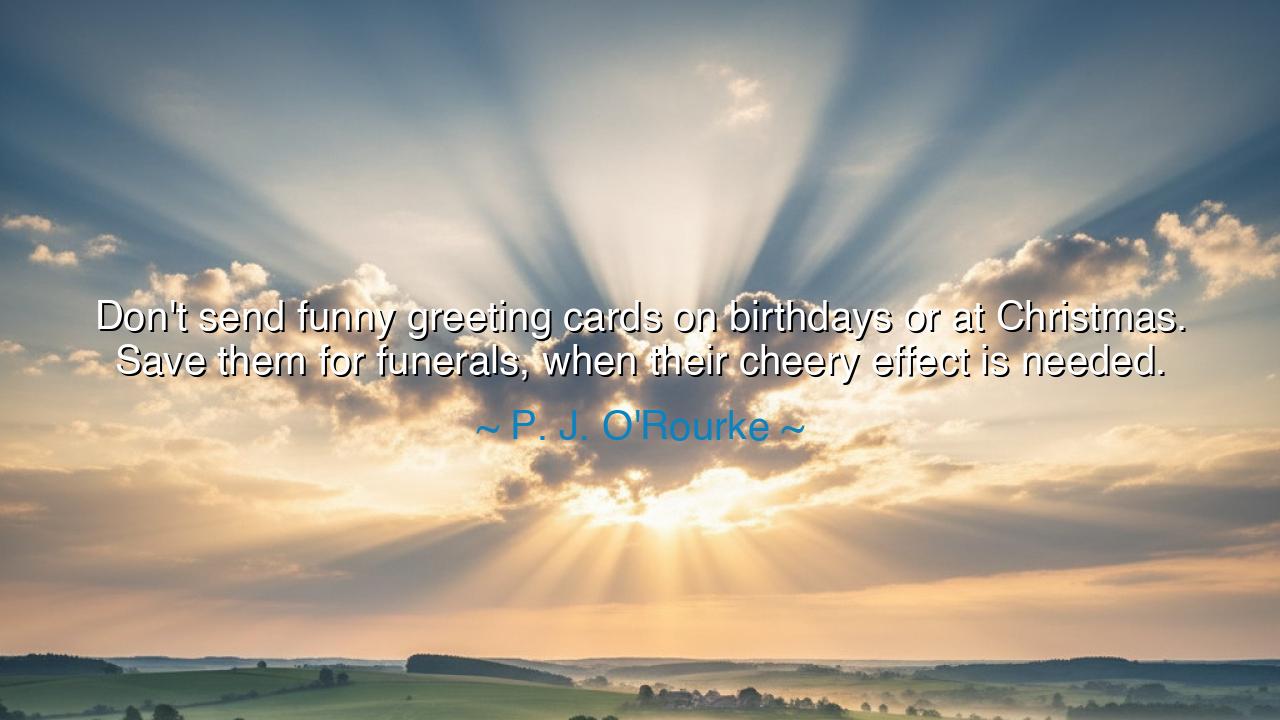
Don't send funny greeting cards on birthdays or at Christmas.
Don't send funny greeting cards on birthdays or at Christmas. Save them for funerals, when their cheery effect is needed.






Host: The cemetery was quiet, but not solemn. The afternoon sun slanted low through the trees, weaving golden threads between the gravestones. A breeze whispered through the grass, carrying with it the faint laughter of children from a nearby park — the kind of sound that makes the living aware of their own breath.
At the center, under a gnarled oak, stood a small folding table, two paper cups of coffee, and a stack of greeting cards that fluttered in the wind like a deck of absurd prayers.
Jack leaned against the tree, his grey eyes fixed on a freshly turned grave. His face carried that mix of defiance and tiredness that always came after grief had settled into sarcasm.
Jeeny, sitting cross-legged on the grass, was reading aloud from one of the cards, her voice both gentle and mischievous.
Jeeny: (reading, smiling faintly) “‘Congratulations on surviving another year without getting eaten by bears.’” (pauses, looking up) “What do you think? Too cheerful?”
Jack: (deadpan) “Not enough bears.”
Jeeny: (flips to another) “Or maybe this one — ‘You’re not getting older, you’re just becoming a classic.’ That feels… morbidly fitting, doesn’t it?”
Jack: (grinning) “Perfect for a funeral. Especially if the guy was actually a classic.”
Jeeny: (laughs softly) “P. J. O’Rourke would’ve loved this. ‘Don’t send funny greeting cards on birthdays or at Christmas. Save them for funerals, when their cheery effect is needed.’”
Jack: (sipping coffee, amused) “He wasn’t wrong. Laughter at a birthday feels like decoration. At a funeral, it’s salvation.”
Host: The wind lifted one of the cards, carrying it a few feet away before it landed face-up — a cartoon penguin wearing a party hat, holding a balloon that said “Hang in there!”
Jeeny and Jack both looked at it for a moment, and then laughed, the kind of laughter that comes from pain, but sounds like release.
Jeeny: “You think it’s wrong? To laugh here?”
Jack: (shrugs) “No. It’s the only honest thing left to do.”
Jeeny: (softly) “People always think grief should be quiet. Like sorrow is a church. But sometimes it’s a circus, Jack — full of memories, noise, and balloons that still float.”
Jack: (nodding slowly) “Yeah. The dead don’t need our tears, Jeeny. They need our stories. Our ridiculous, funny, clumsy love stories.”
Host: A pause. The leaves above them shifted, casting a mosaic of light and shadow across their faces. It looked like a silent film — the kind where the dialogue cards appear between smiles and sighs.
Jeeny: (thoughtful) “When my grandmother died, my uncle brought a cake to the wake. A huge one, with ‘Congratulations on your new adventure!’ written on it.”
Jack: (choking on his coffee, laughing) “No!”
Jeeny: (laughing too) “Yes! People were horrified. Until they weren’t. Until they laughed so hard they cried. It was awful. And perfect.”
Jack: “See, that’s the thing — humor isn’t disrespectful. It’s human. It’s the bridge between what we can’t say and what we still feel.”
Jeeny: (quietly) “Like saying, ‘I miss you,’ without breaking.”
Jack: (softly) “Exactly.”
Host: The sun moved lower, the shadows lengthened, the world turned amber. The stack of cards had thinned, their edges ruffled by the wind — as if time itself had been leafing through them, searching for the right one.
Jeeny: “It’s strange, isn’t it? How death makes people serious, when the dead probably want us to laugh.”
Jack: (nodding slowly) “We spend our whole lives trying to make each other smile, and then at the end, everyone’s too afraid to.”
Jeeny: (smiles sadly) “Maybe that’s what O’Rourke meant — that laughter belongs where it’s hardest to find.”
Jack: (softly) “Yeah. Like a flower growing through concrete.”
Host: The wind shifted, carrying the faint sound of a church bell from the distance — solemn, yet somehow kind. Jeeny began collecting the cards, stacking them neatly, though her hands lingered on each one as if they were prayers.
Jack: (watching her) “You know what’s funny? Every time I’ve lost someone, I remember their laughter more than their words.”
Jeeny: (smiling faintly) “Because laughter doesn’t just echo, it stays. It’s what the soul sounds like when it’s not afraid.”
Jack: (pauses, then quietly) “Then maybe we should laugh louder. So the dead can still hear us.”
Host: Jeeny looked up, her eyes bright with tears that refused to fall, her smile the kind that hurts, but heals.
Jeeny: (softly, half to herself) “You know, I think we’ve been doing funerals wrong. They shouldn’t be about goodbyes. They should be about thank yous — and bad jokes.”
Jack: (grinning faintly) “And cake. Don’t forget the cake.”
Jeeny: “Always cake.”
Host: A moment of silence followed — not heavy, but whole. The kind of silence that comes when grief and gratitude finally recognize each other.
The camera would have pulled back then — two figures beneath a tree, sunlight flickering through leaves, a stack of greeting cards between them like a bridge between the living and the dead.
Host: And as the scene faded, O’Rourke’s words echoed softly in the wind — not as mockery, but as mercy:
“Don’t send funny greeting cards on birthdays or at Christmas. Save them for funerals, when their cheery effect is needed.”
Because humor, when the heart breaks, isn’t irreverence — it’s rescue. It’s how we defy the darkness. How we say, through laughter and tears, that love still lives — even here, among the stones.
And in that final light, Jack and Jeeny began to laugh again — softly, honestly, like two people who had finally understood the most sacred joke of all:
that even in death, the human spirit refuses to stop smiling.






AAdministratorAdministrator
Welcome, honored guests. Please leave a comment, we will respond soon